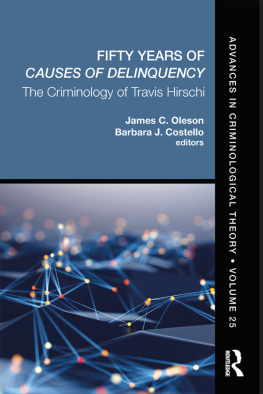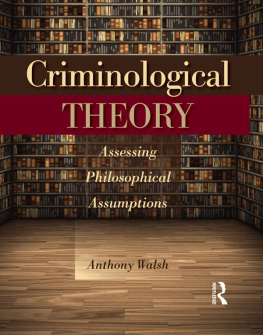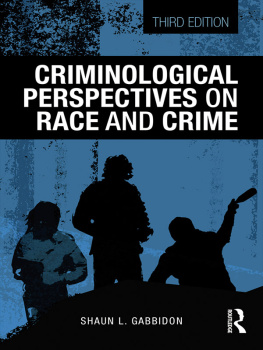James C. Oleson (editor) - Fifty Years of Causes of Delinquency, Volume 25 (Advances in Criminological Theory)
Here you can read online James C. Oleson (editor) - Fifty Years of Causes of Delinquency, Volume 25 (Advances in Criminological Theory) full text of the book (entire story) in english for free. Download pdf and epub, get meaning, cover and reviews about this ebook. year: 2021, publisher: Routledge, genre: Politics. Description of the work, (preface) as well as reviews are available. Best literature library LitArk.com created for fans of good reading and offers a wide selection of genres:
Romance novel
Science fiction
Adventure
Detective
Science
History
Home and family
Prose
Art
Politics
Computer
Non-fiction
Religion
Business
Children
Humor
Choose a favorite category and find really read worthwhile books. Enjoy immersion in the world of imagination, feel the emotions of the characters or learn something new for yourself, make an fascinating discovery.
- Book:Fifty Years of Causes of Delinquency, Volume 25 (Advances in Criminological Theory)
- Author:
- Publisher:Routledge
- Genre:
- Year:2021
- Rating:5 / 5
- Favourites:Add to favourites
- Your mark:
Fifty Years of Causes of Delinquency, Volume 25 (Advances in Criminological Theory): summary, description and annotation
We offer to read an annotation, description, summary or preface (depends on what the author of the book "Fifty Years of Causes of Delinquency, Volume 25 (Advances in Criminological Theory)" wrote himself). If you haven't found the necessary information about the book — write in the comments, we will try to find it.
This volume marks the 50th anniversary of the publication of Travis Hirschis seminal work Causes of Delinquency. The influence of Hirschis book, and the theory of social control it described, can scarcely be overstated. Social control theory has been empirically tested or commented on by hundreds of scholars and is generally regarded as one of the three dominant theories of crime.
The current work highlights the impact that social control theory has had on criminological theory and research to date. Agnews contribution highlights the role that Hirschis tests of control versus strain theory had in contributing to the near demise of classic strain theories, and to the subsequent development of general strain theory. Serrano-Maillo relates control to drift, and Tedor and Hope compare the human nature assumptions of control theory to the current psychological literature. Other contributions return to Hirschis original Richmond Youth Survey (RYS) data and demonstrate the robustness of Hirschis major findings. Costello and Anderson find strong support for Hirschis predictions in an analysis of a diverse group of youths in Fayetteville, Arkansas, in 1999; Nofziger similarly finds support for Hirschis predictions with an analysis of the girls in the RYS, and explores the criticisms of social control theory that were the result of Hirschis failure to analyze the data from the girls in the sample. Kempf-Leonard revisits her seminal 1993 survey of control theory and reviews the current empirical status of control theory. Other contributions explore new directions for both social control theory and self-control theory. The contribution by Cullen, Lee, and Butler holds that one element of the social bond, commitment, was under-theorized by Hirschi, and the authors present a more in-depth development of the concept. Quist explores the possibility of expanding social control theory to explicitly incorporate exchange theory concepts; Ueda and Tsutomi apply control theory cross-culturally to a sample of Japanese students; and Felson uses control theory to organize criminological ideas. Vazsonyi and Javakhishvilis contribution is an empirical analysis of the connections between social control in early childhood and self-control later in life; Chapple and McQuillans contribution suggests that the gender gap in delinquency is better explained by increased controls in girls than by gendered pathways to offending. Oleson traces the evolution of Hirschis control theory, and suggests that, given the relationships between fact and theory, a biosocial model of control might be a promising line of inquiry.
Fifty Years of Causes of Delinquency: The Criminology of Travis Hirschi describes the current state of control theory and suggests its future directions, as well as demonstrates its enduring importance for criminological theory and research. The volume will be of interest to scholars working in the control theory tradition as well as those critical of the perspective, and is suitable for use in graduate courses in criminological theory.
James C. Oleson (editor): author's other books
Who wrote Fifty Years of Causes of Delinquency, Volume 25 (Advances in Criminological Theory)? Find out the surname, the name of the author of the book and a list of all author's works by series.







